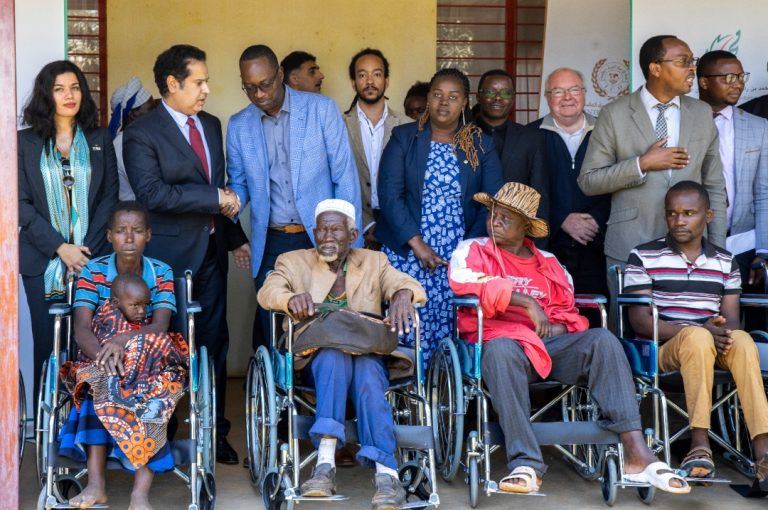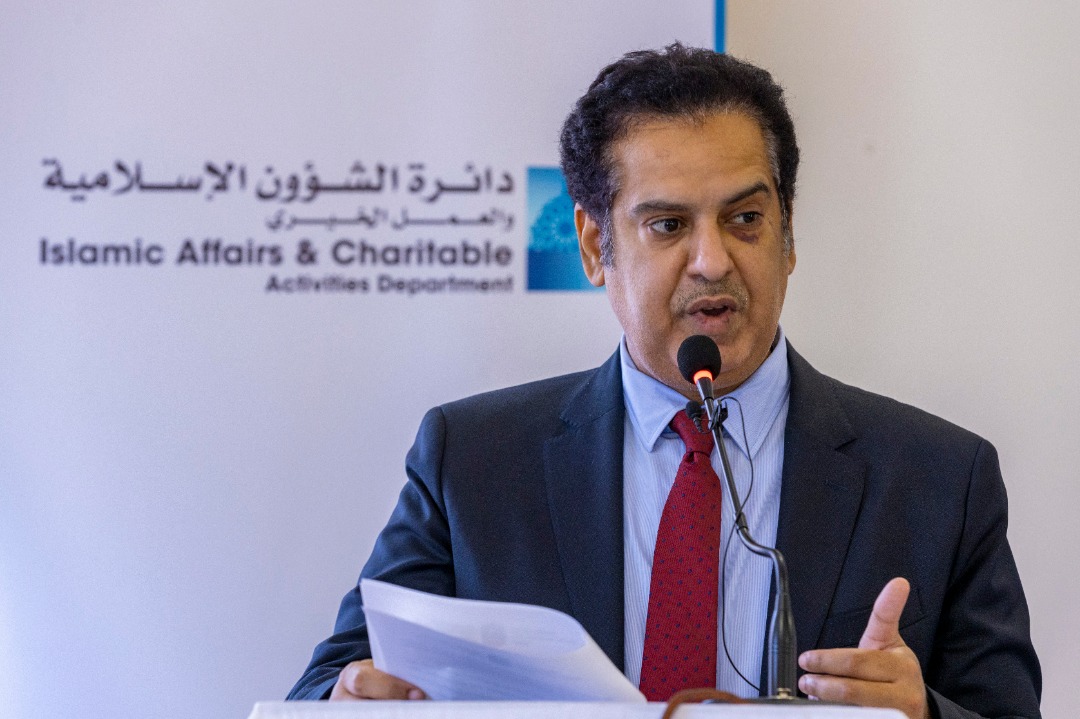
Ambassador Hazza Alqahtani and Minister Daniel Ngamije with beneficiaries of wheelchairs
UAE Ambassador to Rwanda, Hazza Alqahtani yesterday distributed 200 wheelchairs in Rilima, in the presence of Rwandan Minister of Health, Dr Daniel Ngamije, the Director General of Rilima Specialized Orthopedic & Rehabilitation Hospital, and other Bugesera District authorities.
Below is the full speech of UAE Ambassador Hazza Alqahtani:

I would like to first of all say thank you to the Minister of Health for being with us here today and thank you to the Director General of Rilima Specialized Orthopedic & Rehabilitation Hospital for hosting us.
This initiative by the UAE Embassy is in line with the United Arab Emirates strong values of tolerance, dialogue, coexistence and openness to different cultures, which reflects positively on society as a whole.
My country as part of its appreciation and valuing the role of people with special needs, changed the name or designation given to them and replaced it with this name – People with Determination.
In 2019 in Kigali, the UAE Embassy in partnership with UAE Aid Agencies, donated 72 wheelchairs to people with determination. This year, within the same initiative the Embassy will on behalf of three aid agencies, the Mohammed bin Rashid Al Maktoum Humanitarian & Charity Organization, the International Charity Organization & the Islamic Affairs & Charitable Activities Organization, donate 200 wheelchairs.
Allow me to briefly share with you the UAE’s foreign development aid initiatives.
Since the UAE’s establishment in 1971, the UAE has provided significant aid to developing countries and has been a major contributor of emergency relief to regions affected by conflict and natural disasters. Estimated UAE aid from both the government and non-governmental organizations has been valued around $60 billion – used to fund development, humanitarian and charity assistance projects.
The UAE’s aid neither is governed by politics nor is not limited by geography, race, color or religion of the beneficiaries. This is a practical application of the principle of tolerance in the UAE. This policy was laid down by the founder President of the UAE, the late Sheikh Zayed bin Sultan Al Nahyan who stressed that foreign development aid and assistance is one of the basic pillars of UAE foreign policy.
In order to consolidate the impact of its foreign aid, the UAE Cabinet has formed the UAE Humanitarian Committee, which aims to channel and combine the collective expertise of UAE humanitarian responders in order to facilitate, oversee and coordinate the country’s humanitarian aid.
The UAE has adopted the idea of sustainable development and improving the welfare of all humankind.
In 2010, the UAE became the first non-Western country to rank in the top 10 global aid donor per capita. By 2019, the OECD ranked the UAE, for six consecutive years, the world’s largest development assistance donor.
While much of the UAE’s development assistance is provided on a government-to-government basis, the country is also a major contributor to multilateral organizations and the UAE also supports various UN development funds.
Since its foundation in 1983, The Emirates Red Crescent is the UAE’s main humanitarian entity. The ERC is part of the global Red Cross and Red Crescent movement and has established a significant global presence.
There’s also the Abu Dhabi Fund for Development, a non-profit governmental institution that aims to assist developing countries in achieving sustainable economic growth and reduce poverty.
Suqia UAE is a non-profit organization that provides humanitarian aid around the world and provides communities with clean water. This entity is under the Mohammed bin Rashid Al Maktoum Global Initiatives foundation and was established in 2015.
In 2018, the UAE funded programs to improve women’s social and economic empowerment, such as the Women Entrepreneurs Finance Initiative. We-Fi aims to empower women economically in developing countries.
We also have the International Humanitarian City which was established in 2003, and is a global humanitarian hub based in Dubai with the mandate of using its transport and logistics capacity to enable aid agencies to provide emergency relief items to victims of crises. This is just a brief overview of the UAE’s foreign aid policy and humanitarian assistance initiatives.
I once again would like to thank both the Ministry of Health for its continued advocacy and I hope that the assistive devices distributed today will be of great support for our People with Determination. Thank you. (End)
